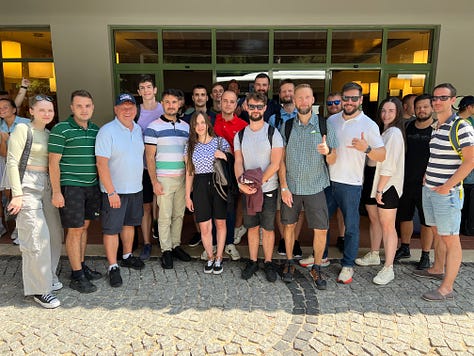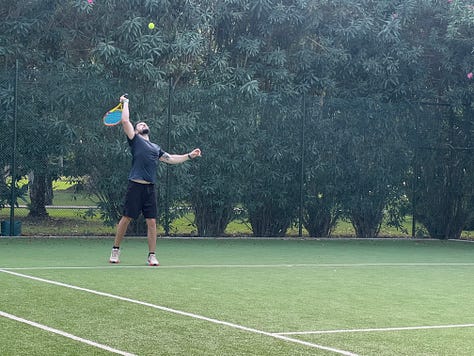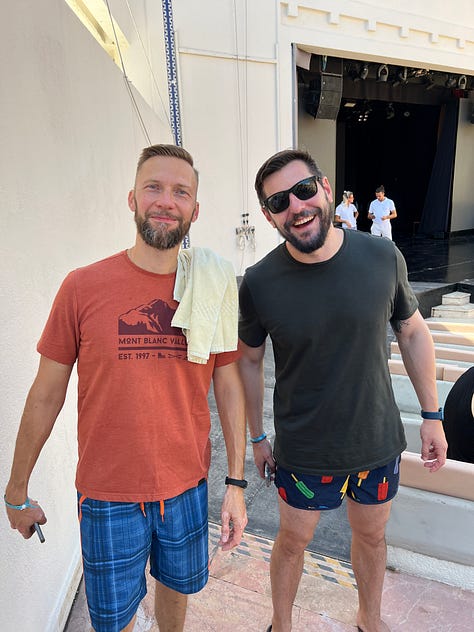#26: Small changes and big results
We often underestimate the power of small improvements in our personal or business life.
Hey friends,
From Wednesday to Saturday, I was in Turkey with the regional technology teams from Central Europe Tax & Legal. For those of you who don’t know, all the software developers at Deloitte CE are part of a regional technology hub. And once a year, around October, we all meet somewhere to get to know each other better and have fun.
So, this week, around 50 people from Romania, Poland, the Czech Republic, Serbia, and Hungary spent some nice sunny days in a resort in Antalya.









It was the first time I’d been to an all-inclusive resort like this. It’s a huge property with a hotel, several villas, 4-5 swimming pools, many restaurants, and very diverse food.
But the thing that impressed me the most was the list of activities you could do at the resort. And most of them were at no additional expense.
From paddle board to water skiing, you could try archery, play, and even take tennis lessons on one of the 10+ courts, play football, basketball, beach volleyball, and even learn some acrobatic moves.
In the evenings, you would have several live shows across the resort, and after that, you could go party in the beach club.
So, aside from eating and drinking with my colleagues in the region, I could do some of these sports as well.
I tried paddleboarding (it’s a lot harder than it seems), I shot with the bow, and I played volleyball, but the one thing I enjoyed the most was playing tennis.
I played tennis for a couple of hours over two days, and I realized I really liked this game. It was the only game I would play with my dad when I was a child, and I don’t know why I didn’t play it anymore after that. So this was probably the third time I played in the last 10 years or so.
And I was thinking? Should I start taking tennis lessons? I am still thinking about it, to be honest, because with work, my online presence, going to the gym, or running, I literally have no time at all. I still want to have some time to spend with my family and friends.
But who knows? Maybe I’ll find a solution and sneak in a couple of hours a week for this activity too. I’ll let you know.
Regarding running, I was happy to get a couple of runs before breakfast. This is very important, as I am one week from the big day: the half-marathon in Bucharest.
I am a bit nervous, especially since my pace has improved over the last few weeks of training, and I’m thinking of setting an audacious goal. But I also need to balance this with my inexperience and the fact that I’ve never run 20K. So, maybe the primary goal is to just finish the damn race 😀
Just wait for the next edition of the newsletter to find out how it went.
The 1% Marginal Gains Philosophy
In a world obsessed with big leaps and disruptive innovations, it's easy to overlook the incredible power of small, consistent improvements.
The “1% Marginal Gains” is a concept that champions incremental progress that can lead to transformative results in business. But where did it all start?
The theory of “marginal gains” belongs to Sir David Brailsford. While this name might mean nothing to you (I never heard of it until a couple of weeks ago), his results are extraordinary.
Brailsford is a performance director hired to bring results for the British National Cycling Team, one of the mediocre teams in the sport.
The results: At the 2004 Olympic Games Great Britain won two cycling gold medals, their best performance since 1908. Under Brailsford's leadership, the cycling team continued to improve, and Great Britain led the cycling medal table at the 2008 and 2012 Olympic Games, winning eight golds at both.
From 2007 to 2017, British cyclists won 178 world championships, 66 Olympic or Paralympic gold medals, and captured five Tour de France victories. This made this ten-year span the most successful era for any cycling team in history!
In reference to the success, Brailsford noted:
"The whole principle came from the idea that if you broke down everything you could think of that goes into riding a bike, and then improved it by 1%, you will get a significant increase when you put them all together."
From tweaking the ergonomics of the bike seat to optimizing the sleep patterns of athletes, every detail was fine-tuned.
We often underestimate the power of small improvements in our personal or business lives.
The idea is neither new nor singular.
Toyota became the best car company in the world thanks to a concept called “kaizen”, meaning “small change”. It's a philosophy that urges all employees, from CEOs to assembly line workers, to engage in continuous improvement.
In his groundbreaking book, “Good to Great”, Jim Collins talks about how the best companies in the world succeed where others have failed using the Flywheel Concept: Building Momentum. Collins describes how companies gain this momentum using reinforcing loops, building speed and energy over time, similar to a flywheel gaining speed with each push.
And of course, more recently, the whole idea of the bestselling book “Atomic Habits” is that tiny changes will lead to extraordinary results.
But how can this help you in the business world?
In business, like in cycling, the devil often resides in the details. By identifying numerous areas of operation, from marketing strategies to supply chain management, and making minor, consistent improvements, organizations can witness compounded growth over time.
Product Development: Tweaking design, improving user experience, or optimizing loading speeds can enhance product appeal.
Sales Strategies: Refining sales pitches or improving response times can increase conversion rates.
Team Productivity: Small changes like more ergonomic workspaces or better communication tools can boost team efficiency.
It's essential to understand that a 1% improvement isn't about short-term results. It's the compounding effect over time that's transformative. Just as compounded interest grows wealth steadily in finance, accumulated marginal gains in business practices can lead to a massive overall advantage. It's about continuous evolution, not revolution.
This concept leads to the philosophy I apply in my own career, and more people should do it in business. Try and fail. When you start making small experiments and you fail early on, you minimize the impact of the failure while maximizing the potential upside.
have a meeting default duration of 50 mins instead of 1 hour
change the office coffee to a better quality one
A/B test your email headlines
There are numerous things you could experiment with to improve your own and your team’s productivity.
While the allure of groundbreaking ideas and giant leaps is undeniable, the 1% Marginal Gains Philosophy reminds us of the strength of persistence and minor enhancements. By consistently seeking small improvements in every aspect of business, leaders can drive their organizations to monumental success, one tiny step at a time.
So, what will you change?
Book recommendation: "Peak: Secrets from the New Science of Expertise" by Anders Ericsson and Robert Pool.
You might not have heard about this book, but there is a high chance you heard about the "10,000-hour rule”. The rule was made popular by Malcolm Gladwell in his bestseller “Outliers”, and, in short, tells us that if you want to become an expert in a skill or in a field, you need to dedicate around 10,000 hours of practice.
What few people know is that the rule is based on a study done by Anders Ericsson and others in 1993 titled "The Role of Deliberate Practice in the Acquisition of Expert Performance." The research was focused on the field of music, specifically on violinists at the Music Academy of West Berlin.
The idea of the book and Ericsson’s findings is that if you want to improve, you need to dedicate a lot of time to “deliberate practice”, which is not just any practice but a structured and purposeful approach to improvement.
There are many people who spend time doing or learning a skill but never get much better at it. That’s because they are not purposeful and fully committed to their training.
Here are some key components of deliberate practice:
Specific Goals: Rather than aimlessly practicing, set clear, specific goals for what you want to improve.
Focused Attention: Deliberate practice requires full concentration. It's not about going through the motions; it's about being mentally present and engaged.
Feedback Loop: Immediate feedback is essential. This allows you to adjust and correct errors, refining your approach continuously.
Practice Outside Your Comfort Zone: Push yourself beyond your current abilities. This might mean practicing a piece of music that's a bit too hard or tackling a problem you've never faced before.
Repetitive Practice: Repetition is vital. It helps reinforce learning and build muscle memory.
Mental Representations: As you practice, develop mental models or visualizations of what good performance looks like. Over time, these mental representations become more detailed and sophisticated, aiding in performance.
Limit Practice Duration: It's hard to maintain intense focus for extended periods. Quality trumps quantity. It's often recommended to practice in shorter, highly focused bursts, with breaks in between.
Seek Expert Guidance: While not always feasible, getting instruction from experts can provide valuable insights and help in directing your practice efforts effectively.
Reflect and Analyze: After practice sessions, take time to reflect on what went well, what didn't, and what can be improved in the next session.
Consistent Practice: Consistency is key. Skills decay over time if not practiced regularly. Maintaining a regular routine is important for continuous improvement.
Rest and sleep are also vital to becoming better performers in any field. For example, a professional athlete would constantly put in 10 hours of sleep every night.
Another key idea of the book is that Ericsson argues that inherent talent plays a lesser role in achieving expertise than previously thought. Instead, with the right kind of practice, almost anyone can achieve expertise.
While it's possible to develop expertise at any age, those who start young (like in sports or music) often have an advantage because they can devote more time to deliberate practice during formative years.
The central theme of "Peak" is that expertise is largely a result of deliberate and purposeful practice rather than mere inherent talent. Ericsson's insights are based on decades of research, and the book provides a comprehensive look at the science of achieving top performance in any field as well as many examples of people who have used the ideas in the book, knowingly or not, to achieve great results.
I plan to use this framework when I learn my next skill (I just don’t know what it is yet).
Thank you for reading, and let me know if you liked something in particular in this newsletter.
Until next time,
Leo
P.S.: If you would like to read my content daily, don’t forget to follow me on Twitter and Linkedin.
P.S. 2: If you want to take your productivity to the next level, check out my extensive Productivity course that can accelerate your career.



